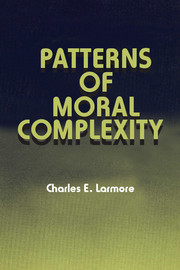Book contents
- Frontmatter
- Contents
- Preface
- Acknowledgments
- Chapter 1 MORAL JUDGMENT – AN ARISTOTELIAN INSIGHT
- Chapter 2 THE LIMITS OF NEO-ARISTOTELIANISM
- Chapter 3 LIBERALISM AND THE NEUTRALITY OF THE STATE
- Chapter 4 THE POLITICAL ORDER AND PERSONAL IDEALS
- Chapter 5 POLITICAL ROMANTICISM
- Chapter 6 THE HETEROGENEITY OF MORALITY
- CONCLUSION
- Notes
- Bibliography
- Index
Chapter 1 - MORAL JUDGMENT – AN ARISTOTELIAN INSIGHT
Published online by Cambridge University Press: 05 June 2012
- Frontmatter
- Contents
- Preface
- Acknowledgments
- Chapter 1 MORAL JUDGMENT – AN ARISTOTELIAN INSIGHT
- Chapter 2 THE LIMITS OF NEO-ARISTOTELIANISM
- Chapter 3 LIBERALISM AND THE NEUTRALITY OF THE STATE
- Chapter 4 THE POLITICAL ORDER AND PERSONAL IDEALS
- Chapter 5 POLITICAL ROMANTICISM
- Chapter 6 THE HETEROGENEITY OF MORALITY
- CONCLUSION
- Notes
- Bibliography
- Index
Summary
KANT ON EXAMPLES
In this chapter I want to reestablish an Aristotelian insight that modern moral theories have systematically neglected. It is the importance of judgment, or what Aristotle called φρόνησις, in moral deliberation. However, I shall begin by discussing the question of what role examples may have in moral experience. This strategy is only apparently circuitous. The role assigned to examples is symptomatic of how much the significance of moral judgment is appreciated, because the use of examples forms one way in which judgment is exercised. Indirectly, then, I shall be trying to rehabilitate the significance of examples in moral deliberation. But my chief aim will be to establish the centrality of judgment in moral deliberation and to explain why there has been so much resistance to recognizing it.
A familiar view of moral examples gives them, we might say, a rhetorical rather than a logical role. This view prevails in modern ethical theories. Examples, it is urged, have the task of persuading us to do our duty. They excite the imagination and the passions in a way in which, supposedly, moral rules and reason in general are less able to do; and since most of us are not motivated most of the time by rules and reason alone, examples serve an indispensable function. Observe that this view treats examples only as a means for motivating us to act in accord with what has already been determined to be our duties in the situation at hand.
Information
- Type
- Chapter
- Information
- Patterns of Moral Complexity , pp. 1 - 21Publisher: Cambridge University PressPrint publication year: 1987
